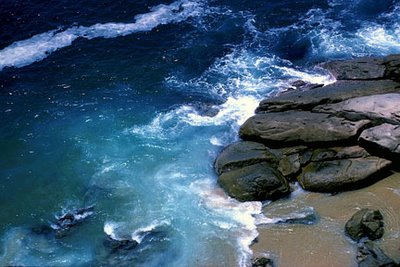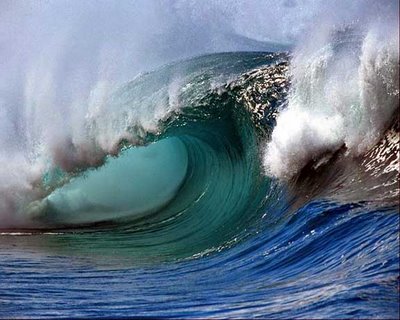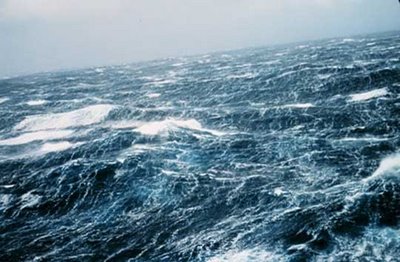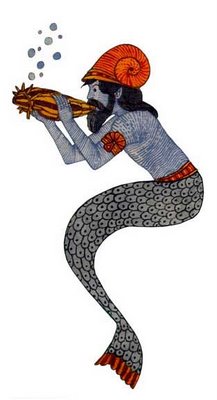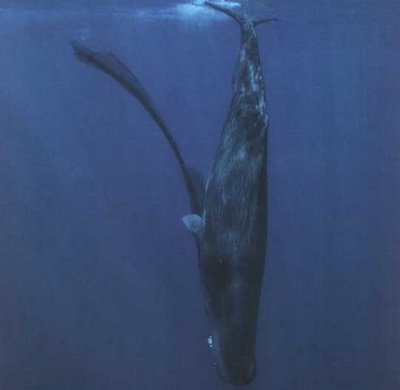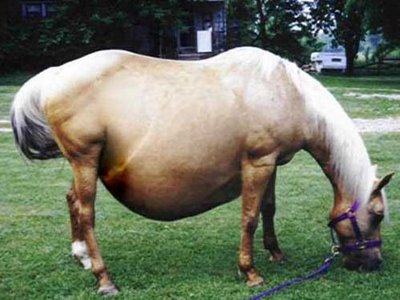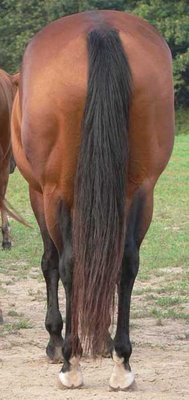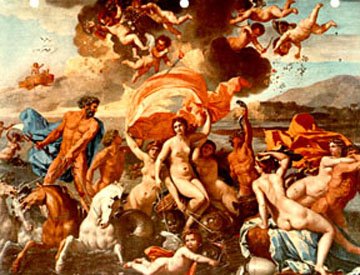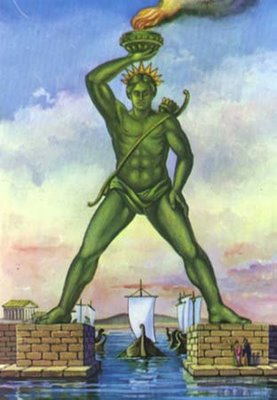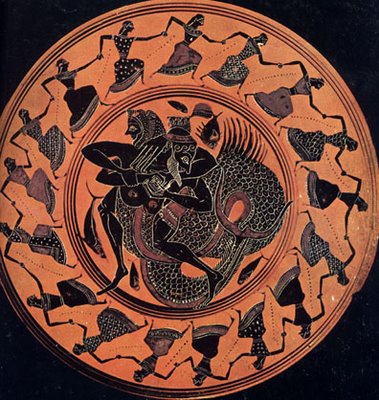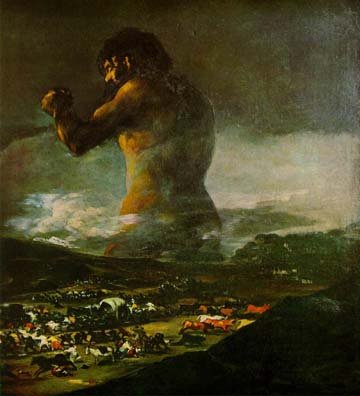Water Song

ON VISITING STAFFA
John Keats
Not Aladdin magian
Ever such a work began;
Not the wizard of the Dee
Ever such a dream could see;
Not St. John, in Patmos' Isle,
In the passion of his toil,
When he saw the churches seven,
Golden aisled, built up in heaven
Gazed at such a rugged wonder.
As I stood its roofing under,
Lo! I saw one sleeping there,
On the marble cold and bare,
While the surges wash'd his feet,
And his garments white did beat
Drenched about the sombre rocks.
On his neck his well-grown locks,
Lifted dry above the main,
Where upon the curl again.
"What is this? and what art thou?"
Whispered I, and touched his brow.
"What art thou? and what is this?"
Whispered I, and strove to kiss
The spirit's hand, to wake his eyes.
Up he started in a trice:
"I am Lycidas," said he,
"Famed in funereal minstrelsy!
This was architected thus
By the great Oceanus --
Here his mighty waters play
Hollow organs all the day;
Here by turns his dolphins all,
Finny palmers great and small,
Come to pay devotion due --
Each a mouth of pearls must strew.
Many a mortal of these days,
Dares to pass our sacred ways,
Dares to touch audaciously
This Cathedral of the Sea!
I have been the pontiff-priest
Where the waters never rest,
Where a fledgy sea-bird choir
Soars for ever; holy fire
I have hid from mortal man;
Proteus is my sacristan.
But the dulled eye of mortal
Hath passed beyond the rocky portal;
So for ever will I leave
Such a taint, and soon unweave
All the magic of the place.
'Tis now free to stupid face,
To cutters and to fashion boats,
To cravats and to petticoats.
The great sea shall war it down,
For its fame shall not be blown
At every farthing quadrille dance."
So saying, with a Spirit's glance
He dived!

So the myth disappears into the sea, and the heart which follows it becomes the sea's
...
THE STORY OF ALPHEUS AND ARETHUSA
Ovid Metamorphoses, Book V
Translated by Sir Samuel Garth, John Dryden, et al
Still were the purling waters, and the maid (Arethusa)
From the smooth surface rais'd her beauteous head,
Wipes off the drops that from her tresses ran,
And thus to tell Alpheus' loves began.
In Elis first I breath'd the living air,
The chase was all my pleasure, all my care.
None lov'd like me the forest to explore,
To pitch the toils, and drive the bristled boar.
Of fair, tho' masculine, I had the name,
But gladly wou'd to that have quitted claim:
It less my pride than indignation rais'd,
To hear the beauty I neglected, prais'd;
Such compliments I loath'd, such charms as these
I scorn'd, and thought it infamy to please.
Once, I remember, in the summer's heat,
Tir'd with the chase, I sought a cool retreat;
And, walking on, a silent current found,
Which gently glided o'er the grav'ly ground.
The chrystal water was so smooth, so clear,
My eye distinguish'd ev'ry pebble there.
So soft its motion, that I scarce perceiv'd
The running stream, or what I saw believ'd.
The hoary willow, and the poplar, made
Along the shelving bank a grateful shade.
In the cool rivulet my feet I dipt,
Then waded to the knee, and then I stript;
My robe I careless on an osier threw,
That near the place commodiously grew;
Nor long upon the border naked stood,
But plung'd with speed into the silver flood.
My arms a thousand ways I mov'd, and try'd
To quicken, if I cou'd, the lazy tide;
Where, while I play'd my swimming gambols o'er,
I heard a murm'ring voice, and frighted sprung to shore.
Oh! whither, Arethusa, dost thou fly?
From the brook's bottom did Alpheus cry;
Again, I heard him, in a hollow tone,
Oh! whither, Arethusa, dost thou run?
Naked I flew, nor cou'd I stay to hide
My limbs, my robe was on the other side;
Alpheus follow'd fast, th' inflaming sight
Quicken'd his speed, and made his labour light;
He sees me ready for his eager arms,
And with a greedy glance devours my charms.
As trembling doves from pressing danger fly,
When the fierce hawk comes sousing from the sky;
And, as fierce hawks the trembling doves pursue,
From him I fled, and after me he flew.
First by Orchomenus I took my flight,
And soon had Psophis and Cyllene in sight;
Behind me then high Maenalus I lost,
And craggy Erimanthus scal'd with frost;
Elis was next; thus far the ground I trod
With nimble feet, before the distanc'd God.
But here I lagg'd, unable to sustain
The labour longer, and my flight maintain;
While he more strong, more patient of the toil,
And fir'd with hopes of beauty's speedy spoil,
Gain'd my lost ground, and by redoubled pace,
Now left between us but a narrow space.
Unweary'd I 'till now o'er hills, and plains,
O'er rocks, and rivers ran, and felt no pains:
The sun behind me, and the God I kept,
But, when I fastest shou'd have run, I stept.
Before my feet his shadow now appear'd;
As what I saw, or rather what I fear'd.
Yet there I could not be deceiv'd by fear,
Who felt his breath pant on my braided hair,
And heard his sounding tread, and knew him to be near.
Tir'd, and despairing, O celestial maid,
I'm caught, I cry'd, without thy heav'nly aid.
Help me, Diana, help a nymph forlorn,
Devoted to the woods, who long has worn
Thy livery, and long thy quiver born.
The Goddess heard; my pious pray'r prevail'd;
In muffling clouds my virgin head was veil'd,
The am'rous God, deluded of his hopes,
Searches the gloom, and thro' the darkness gropes;
Twice, where Diana did her servant hide
He came, and twice, O Arethusa! cry'd.
How shaken was my soul, how sunk my heart!
The terror seiz'd on ev'ry trembling part.
Thus when the wolf about the mountain prowls
For prey, the lambkin hears his horrid howls:
The tim'rous hare, the pack approaching nigh,
Thus hearkens to the hounds, and trembles at the cry;
Nor dares she stir, for fear her scented breath
Direct the dogs, and guide the threaten'd death.
Alpheus in the cloud no traces found
To mark my way, yet stays to guard the ground,
The God so near, a chilly sweat possest
My fainting limbs, at ev'ry pore exprest;
My strength distill'd in drops, my hair in dew,
My form was chang'd, and all my substance new.
Each motion was a stream, and my whole frame
Turn'd to a fount, which still preserves my name.
Resolv'd I shou'd not his embrace escape,
Again the God resumes his fluid shape;
To mix his streams with mine he fondly tries,
But still Diana his attempt denies.
She cleaves the ground; thro' caverns dark I run
A diff'rent current, while he keeps his own.
To dear Ortygia she conducts my way,
And here I first review the welcome day.
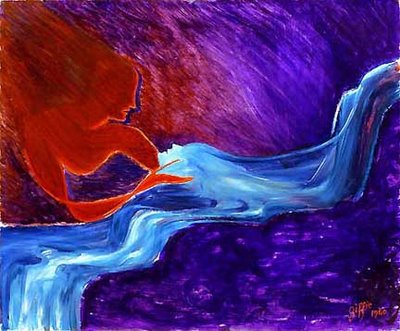
So the hunter Alpheus merges with the nymph Arethusa when she transforms herself into a spring and becomes the river Alpheus, flowing through that spring out into the sea as an underwater current. Roberto Calasso comments:
He was a hunter who one day decided to become nature. He was the only lover who, when his beloved turned to water, agreed to become water itself, without wanting to be held back by the boundaries of identity. He thus achieved a union no other man or woman had ever achieved, the union of two freshwater streams soon to plunge together into the sea.
... Alpheus and Arethusa: water with water, the spring that gushes from the earth, the current that rises fro the depths of the sea, the meeting of two lymphs which have travelled far, the ultimate convergence, perennial happiness, no bastions against the world, gurgling speech.
-- The Marriage of Cadmus and Harmony,
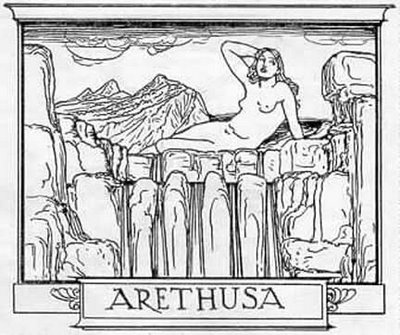
WATER SONG
June 2
And if the earthly no longer knows your name,
whisper to the silent earth: I'm flowing.
To the flashing water say: I am.
- Rilke, Sonnets to Orpheus 2.24
The sight of you is pure water,
turning my throat into a river
hurrying with eagerness
and joy in the plunge of deepest seas.
We greet each other in the
kiss which makes a language blue,
my words a teeming haul
of fish netted in a womb
of soak, brilliant infinitesimals
we share beyond all shores,
all hope of waking up.
Song is just well-silver
delved from your deepest slopes,
a curve inside my heart
so voluptuous in rapture of you
as to cause the world to quake.
That pent thunder causes
this pen to unleash the
brassy bells of scalt heaven,
pealing every bright name
for love to gout from
the drown of coiled hips.
All this tides so far below
the day which
wearies everything
in its hard inland breeze,
withering the orange groves,
making delight a dust
fretted away too long ago.
But I have learned the
tide is greatest where
it ebbs fullest away; the
absences of later life
boom in sea-caves far below
where you and I forever greet
and choir our salt amens,
soul to soul in one blue wash,
bedded in our emptiness.
Did I say how when you
turned in sleep, my sigh
was fraught with the ten
thousand strands of crashing
waves I've ridden on that
cresting waist to hip
here on the page
and off in the wounded
current of our life,
inside a marriage that can't die
no matter how it does.

FRENCH KISS
2003
Sometimes the ink
is pure glossolalia,
the skull-babble
of a dozen tongues
all crashing in the surf
I send to God.
Heart-prayers have
a voice which words
as they are used
all fail, and so it
skips the sounds,
like a stone, over
the waves, freed
of root in sense or
meanings my dry
usages ascribe.
The heart wells
up a torrent which,
unblocked by
dayside will, rises
a wild fountain
which drowns the
world in Yes.
Joyce released his
pen that way in
Finnigans Wake,
a "scherzarade
of one's thousand
one nightinesses"
-- a 17-year effort
to plumb the words
of dream. Its
prose is incoherent,
a fabulous babble
which washes
every page with
thunder. It
"truck his spickle
through his
spoke, disappeared
... from the sourface
of the earth, that
austral plain he
had transmarried
himself to, so
entirely spoorlessly
... as to tickle
the speculative to
all but opine ... that
the hobo ... had
transtuled his funster's
latitat into its
finsterest interrimost."
Yeah whatever he
he said, or spouted.
Surely such joys
have a riverish
gush, spring
boldened, lusty in
the crash of early
love's fool errands,
believing no thighs
unparted, no height
not swimmable --
I recall spring '82
when some woman
took me on the wings
of rock n roll
fantasy, asking for
a ride home from
the club and then
commanding me pull
over, tearing free
our clothes & then
fucking me in that
cramped Datsun
as savage as some
Scylla, hauling up
a torrent which lathered,
soaked, crashed,
spurned and then
nearly drowned us both
for a month or so.
One Saturday morning
I woke in that
bed I called (provisionally)
my own, with gum
in my pubic hair (she
parked it there) and
my words suddenly
unhinged, "rollicking,"
"verb-mated with lust,"
as if a thousand nunlike
nouns had all been
fucked silly and were
now sprinting with
merry devils on the lawn,
mewling and shrieking
Hell Yes. Certainly
sex as I desire
lubricates the jaw,
loosening a wavelike
torrent meant (I
think today) to circle
Her sweet ankles
and free all her bows
to the undertow
I'll never row.
Then (I also think
today) that sex goes
underground, freed
from mortal hips, so
to speak, to chase
Eurydices within and
the snakes she
augurs there. The
Pythoness was
maddened by Delphic
gasses rising from
the cracked floor,
her words vomiting
in a flow no man
could quite understand,
a chum of vowels
reddening the holy
blue, rousing appetites
which fin and maw
and chomp and chew
-- blah blah blah,
I usually think
about this time,
conscious how I've
gone on and on.
No poem's done, just
emptied of its
heart -- all
verbiage leashed, the
white shore bright
again, naked of Her
though I'm sure
she still calls me there,
standing in a shimmer
of my summer heat,
a curve of tongue
and home, her eyes
blue as my wife's,
our cat's, the dawning
day's -- a pale serene,
all the wings of
heaven once more
bathed & swathed
in aquamarine.

SECRET LANGUAGE
2006
It's taken years to learn the
secret words of blue,
decades, who knows: my
life in this salt scriptorium
upon my writing chair
may just be latest attempt
by oral veins to route
that sound full back on the tongue.
Perhaps the work is slow
because teachers are these
days so few, the old brute
waters so fished out, too
many darks now known,
the corpus callosum which
verbs the milk of sapience
from beloved distant breasts
tattered, rent by to much
light, perhaps, or too few pyres.
Who knows. Every age bears
a cross inside its new
articulations, its own
perplexities to addle
the augments of blue.
My familiars morphed
from the usual suspects
-- my mother's voice next
to the sea; my father's
words in rooms of stone--
girls too who said my name
like butterflies on a summer
day, so gossamer I could not
hold them in my arms, much
less say their names or write
them on the page. -Oh and
brutaller instructors too,
that bad sound of baleen-sieving
nights when I inhaled
too much musk and
whiskey in the smoke of
of lousy bars, nosing
my way to that brassy clang
which peals all shores
ululate and undulate
and undying for one night.
All those delights and
dolors ranged my timbre's
hues: But just how to say
or sing full back the
bull-freight of blue? I
read, I wrote, I read wrote
more, over and over, day
after day for years, each
mornings's embarcature
like the jaywalker who
loves wild crossings more
than getting safe across or
the barrel-diver who gets
a rise from fatal falls.
This morning's poem is
my latest exempla
of servitude to words
which woof and wrangle
and perturb the petticoats
of a nakedness I'll never
find words true enough for --
I mean true wilderness,
where names in their
ferallest pelts cavort and
plunge in sylvan thunder.
I always think I'm getting close
but each time I end up here
trying to wrap lacunas up
with something blue enough,
an azurish button of a couplet
or a pale sheet of metaphorcials
fluttering down on stated lovers
in the lysis of pure descent,
the picture fading full
to black just as the curvatures
die fully draped. But I can't
end this thing, not yet, I
haven't learned the ends of
that secret tongue. Or perhaps
that language knows no closure.
Perhaps the tongue of sea-
faring angels was meant for
endless tides of days and
hangs forever here, on
the same wave that I
started from when I
looked up at my mother
standing over me and sang
the sea right back. The
secret song is thus all the
ones a heart pours out
in gratitude for seas.
That works for me today
as I walk back from one shore
and begin to walk upon
next, hearing my wife sigh
and stir. I shut this book
to head upstairs and
lay next to her in pink
first light, and there run my
fingers across her soles just
so, again and again so soft
and slow, singing first
and last what only tongues
of angels know.
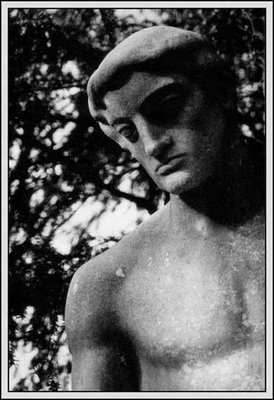
MYTHOS
April 2005
I cannot harrow through your pass of awfulness
without the myth, nor boat but mythically,
my outrage in your titan gorge affrontal
in its nudity, a fish-boy jamming his song on
through astride a whalish steed. All of that
is pure mythos, upside-down the actual
moment in which I write, at this small hour in
my writing chair in the house love tends
in tenderest frail bloom. My ache for You
is bluest in the green bells of sweet spring
now pealing everywhere the sun doth shine,
a moon inside the rising heat of days,
its bone knuckle fleshed by my wife's touch.
I came to You through our cat in the
window, her Siamese perfection of
the fairest spleen to grace this world or
the next. She stares back from that night
with Your eyes, bluer than the blackest
gale to split a ship in two. There's little
wild invitation in my wife after all these years,
though she loves me more vitally than ever --
our margins these days civil and humane and
neighborly and partnered, working on our
house together, sharing the day's wounds and
worries and outrages over dinner by TV,
co-conspirators in a leisure which pools
the fading day outside. Nothing there of that
desperate isle of fairy women it is death
to harbor and delight, their need for me
so much deeper than my own deep need
for sex as to suck me dry with every look
my way, their mouths like burning books,
their nipples angry red and leaking milk
each anguished writhe they make for me,
hips desperate to join with mine, loins
bawling for my seed. Yet my wife is selkie in
that way, her dry land days of mortal love
chaste and aging as wives go, though in sleep
and the unsayable sounds a seal in cold waters
which surrounds and abounds out there,
offshore of our weary, worried, paradisally
ever-working lives. I'll never know the true
depths of her, though our years grow broad
and wide. That's the way I've learned to sing,
instructed by blue waters I've sought for years
and will never see the end of nor truly walk
or name, though I can't stop writing the
next salt surgency upon a white whale's mane,
this book I mean, the one I'll never publish,
the one my wife will ever read. It sings
to her all night while the mortal doofas that
I am sleeps next to her, snoring and farting
and growing hard as I dream of her, harder
than I'll ever get inside her love again.
My hand around this pen is writing Cape
Blue gibberish on the pale sweet curve
of her warm bottom in our bed upstairs,
every name of God I've loved in this
bottomless mythos of words an hour
before we start our next working day.
